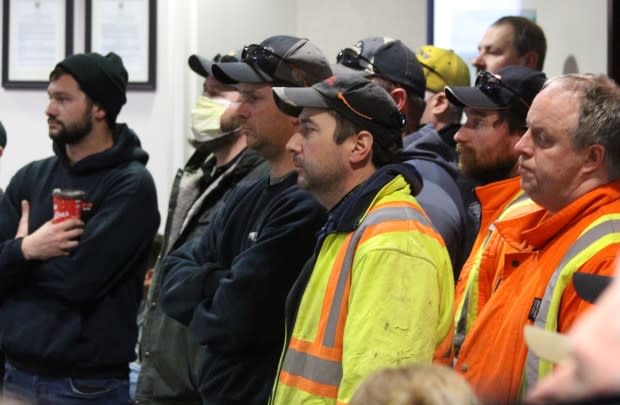Moncton eyes switch from garbage bags to carts, privatization of collection
Moncton is considering changes to its garbage collection system that could affect how residents leave waste at the curb and city employees who collect it, according to two tenders issued recently.
The first calls for a private company to collect household waste, a task traditionally done by unionized city employees.
The second says the city is considering switching from plastic bags to carts for waste at houses and apartment buildings with five or less units. It seeks a company to supply more than 70,000 carts that could be collected with an automated boom on a truck.
Any change requires city council approval.
Several councillors and the union representing outside workers say they were surprised by the tenders, saying staff had seemed to brush aside switching to carts in the past and expected further discussion of privatization before a tender would go out.
"We are always told that the bin system was too expensive, that to update the [truck] machinery would be too expensive, and that the sorting process could not be handled by the citizens of Moncton," Deputy Mayor Shawn Crossman said.

CBC News requested an interview with the city Wednesday about the tenders but no interview was provided.
Isabelle LeBlanc, a city spokesperson, said in an email that staff were directed by council earlier this year to explore contracting out the service, continue using city employees but adding a second person to each truck, or using an automated boom that would collect carts.
LeBlanc said the tenders allow staff to present council with "real market value for the three proposed options."
Crossman supports switching to carts. He's heard from residents frustrated by irregular collection times and garbage spread around neighbourhoods after plastic bags have been ripped open by animals.
Coun. Paulette Thériault also supports switching to carts.
"From an environmental perspective, it would make a lot more sense, and I think it would be a lot easier for the residents," Thériault said.
Shift to private collection
The city's waste collection system recently left it at odds with municipal workers who are members of the Canadian Union of Public Employees Local 51.
City staff cited climbing injury rates and retention issues as reasons to temporarily use a private company for collection in one of the city's seven waste collection zones. Councillors voted in 2018 to return to collection by city workers only, but that didn't happen.
Since then, Fero Waste and Recycling Inc. has gone from collecting waste in one zone to six. Local 51 members regularly attended city council meetings last winter as the sides neared a lockout or strike.
"Frustrated is the word I'd use," Keith Hatto, a vice-president with the local, said of the tender that could privatize collection. He said the city hadn't told the union a tender would be issued.
LeBlanc said the city was under "no obligation" to inform the union.
In April, staff told council Fero's contract needed to be extended into December while they examined what to do with the collection system.

Under the current system, residents of homes and apartment buildings with up to five units put recyclable materials in a blue bag, organics in a green bag and garbage in a clear bag.
A city worker drives the truck, gets out, tosses the bags into the truck, then continues to another pickup point. Each worker tosses approximately eight to nine tonnes of material from about 650 households per shift, according to figures city staff presented to council several years ago.
A 2017 risk assessment looked at ways to reduce worker injuries. The assessment recommended adding a second worker to each truck, reducing the pace and volume of work, and adding a mechanical arm to trucks which would grab large bins.
The mechanical arm was estimated to cost $2,696,628 per year or $110.44 per household. The switch would include the purchase of three large carts per household.
Hatto said the union had suggested the city switch to carts given the concerns about injuries. Instead, the city used the private contractor.
"I'm kind of surprised that they're bringing it back up," Hatto said.
If collection is privatized, he said, the union contract would see affected workers shifted to other city roles.

It's not clear based on the tenders whether households would have to pay for each cart or if that cost would be paid by the city.
"I was always told by my city staff that these bins were expensive, and the end user would have to be the one paying for them," Crossman said.
If the city opts not to privatize collection, it would still need new or retrofitted trucks if it switches to the cart system.
Carts could roll in 2022
It's not clear exactly when the results of the tender will go to city council, though LeBlanc said it will be sometime before the 2021 budget process.
One tender says that if council approves the switch, the 10-year contract to supply the carts would begin May 1, 2021.
Residents would be able to select the quantity and size of carts for their household. The carts would be delivered in May and June 2022.
The tender calls for carts that can last 10 years and withstand temperatures between –40 Celsius and 55 C.


